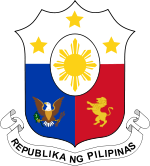- Commission on Audit (Philippines)
-
Philippines 
This article is part of the series:
Politics and government of
the PhilippinesLegislature- Congress (15th Congress)
- Senate
- House of Representatives
- Speaker
- Legislative districts
- Sectoral representation
ExecutiveJudiciaryRelated topics
Other countries · Atlas
Philippine Government Portal
The Commission on Audit is an independent constitutional commission established by the Constitution of the Philippines. It has the primary function to examine, audit and settle all accounts and expenditures of the funds and properties of the Philippine government.[1]
Contents
Composition
The Commission on Audit is composed of a Chairperson and two Commissioners. They must be natural-born citizens of at least thirty-five years of age, and must be either a Certified Public Accountant or a lawyer. The members of the Commission are appointed by the President of the Philippines, with the consent of the Commission of Appointment, for a term of seven years without reappointment.[2] On April 18, 2008, President Gloria Macapagal-Arroyo appointed Reynaldo Villar as chairman of the Commission until February 2, 2011, in lieu of the retiring Guillermo Carague.[3]
Functions
The Commission has the power, authority and duty to examine, audit and settle all accounts and expenditures of the funds and properties of the Philippine government. Towards that end, it has the exclusive authority to define the scope, techniques and methods of its auditing and examination procedures. It also may prevent and disallow irregular, unnecessary, excessive, extravagant or unconscionable expenditures, or uses of government funds and properties.[4]
History
In 1983 the Commission hosted XI INCOSAI, the eleventh triennial convention of the International Organization of Supreme Audit Institutions.[5]
External links
- "The Official Website of the Commission on Audit". http://www.coa.gov.ph/. Retrieved 2008-03-23.
References
- ^ Section 2(1), Article IX-D, Constitution of the Philippines.
- ^ Section 1(1) & (2), Article IX-D, Constitution of the Philippines
- ^ Inquirer.net, Arroyo names new CoA chief
- ^ Section 2(2), Article IX-D, Constitution of the Philippines.
- ^ INTOSAI: 50 Years (1953-2003). Vienna: International Organization of Supreme Audit Institutions. 2004. p. 57
Categories:- Government of the Philippines
Wikimedia Foundation. 2010.
